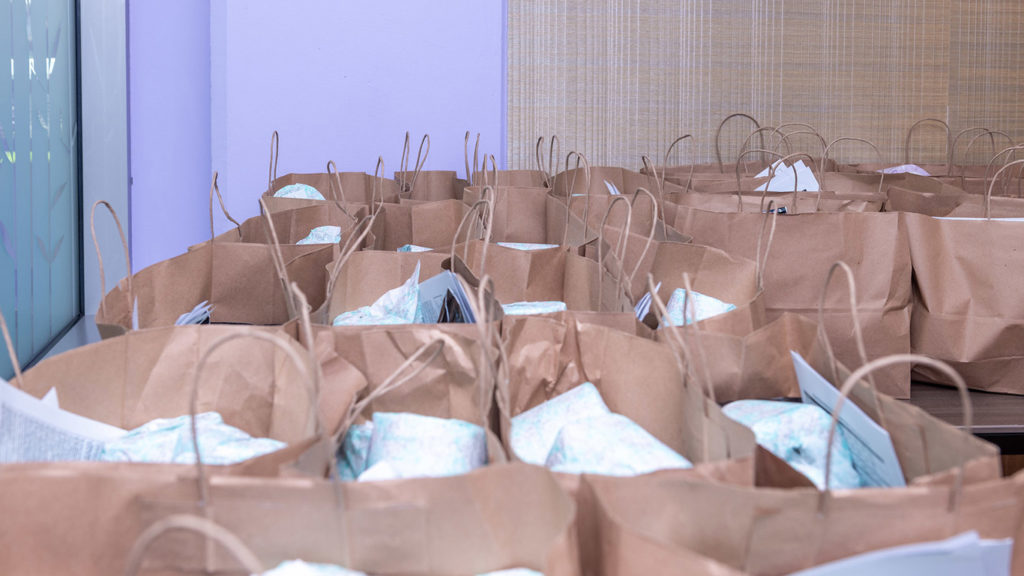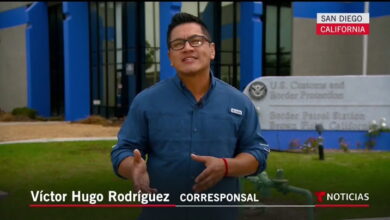
Despite operational limitations in place on campus to help prevent the spread of coronavirus (COVID-19), the Basic Needs Office at California State University, Dominguez Hills (CSUDH) has found a new way to continue distributing food to the students who need it most.
When the CSU system called on campuses to immediately transition in-person operations to virtual mode, the Basic Needs Office began exploring ways to ensure the food pantries at CSUDH continued to serve the needs of students. Key was the consolidation of two main food pantries in the Office of Student Life and the Women’s Resource Center. They also needed to create a system that adhered to social distancing guidelines.
The result was a temporary nonperishable food bag distribution program set up in the LSU’s Meditation Room.
UPDATE: As of March 30, the university has closed the Toro Food Pantry to further reduce the number of people coming to campus and support stay-at-home mandates meant to slow the spread of COVID-19 cases. University officials are exploring other options to provide this essential program to students in need. For up-to-date information, visit the Toro Food Pantry web page.

“Our students are experiencing more hardship than ever before with this sudden wave of unemployment, and the ongoing food and housing insecurity many of them face,” said Morgan Kirk, coordinator of the university’s Basic Needs Office, who added that 61 percent of CSUDH students were food insecure before the crisis. “Buying food is a lot more confusing right now, and many students just don’t have money to do so. That’s why this temporary program is so essential.”
The food pantry program has faced more than operational limitations since the COVID-19 crisis began. Kirk said that replenishing the pantry’s food supplies has also proved difficult. “We can’t just wait for stores like Amazon or Walmart to send supplies. We are back ordered until sometime in April, or even May,” she said. “It’s important for us to provide this alternative until then, and we have received a lot of support from this wonderful campus.”
Campus Dining has stepped up with consistent donations of nonperishable food for the program. In addition, Elizabeth Schrock, CSUDH’s Title IX officer and interim discrimination, harassment, and retaliation administrator, picked up food from Food Finders, a nonprofit food bank the Basic Needs Office partners with to provide donations to campus once or twice a month. The food donations have been split between the food bag program and University Housing’s food pantry, which remains open since some students still live on campus.
“All the donations and support has been amazing. Today we were able to make 52 bags. I know a lot of students are afraid to come on campus, so this first batch will tell us how much food we need to order from Campus Dining moving forward,” said Kirk. “It is my duty and my job to make sure that our students have access to some kind of food, and important that we all work together to make that happen.”
CSUDH’s CalFresh Food Coordinator Carolyn Tinoco, the Toro Guardian Scholars program, and the Office of Student Life have also pitched in.
Kirk has been humbled by the “heart and courage” her student assistants have shown by assembling the bags–practicing social distancing–and helping run their food distribution effort.
“My students have been amazing. I know a lot of them are caught up in the frenzy and the anxiety of COVID-19, so I appreciate them so much,” said Kirk, who is the only full-time employee in the Basic Needs Office. “They saw a huge need for this, and it fills them up with joy knowing that they are helping out their peers. They are really holding this program together. I can’t thank them enough.”









